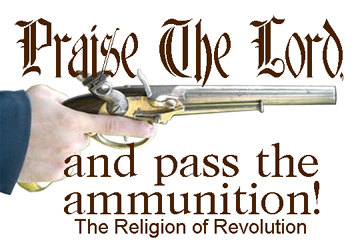| The Breed's Hill Gazette May 2009 | |
 |
|
|
Praise the Lord & Pass the Ammunition By Dan Shippey & Michael Burns
Outside the church, icy cold air bit at the skin. Inside, however, the temperature was rising rapidly.
The 30-year-old pastor was full of fire as he
delivered his sermon before the congregation. He had just launched
into the third chapter of Ecclesiastes:
“There is a time to rend, and a time to
sew A time to keep silent, and a time to
speak A time to love, and a time to hate
A time of war,”
He paused and his eyes swept across the faces
before him. It seemed for a brief second that he looked at, and
into, every one of them. “And this is a time of war!” He pulled open his clerical robe to reveal a Colonel’s uniform. The next morning he would lead 300 volunteers (many from his congregation) to form the center of the Eighth Virginia Regiment.
They would see action at the Battle of
Brandywine, The Battle of Germantown and the Battle of Monmouth. A
year later the Reverend cum Colonel would be promoted to
Brigadier General Peter Muhlenberg.
The concept of a warrior/pastor seems oxymoronic in today’s
society. It is difficult to picture your reverend, priest or rabbi
taking the field of battle. The churches and synagogues today seek
to avoid battle, to be inoffensive even when it comes to their core
values, so as to appear “seeker friendly.” But the church of the 18th
century was not only involved in the revolution, it was one of the
reasons the revolution was possible.
The Great Awakening was the period during the 1730’s-40’s,
when the
|
“Onward Christian Soldiers” would not be written until 1864,
but the stories of Pastors leading their congregations into the
field of battle can be found from the very first days of the War for “I have trained them for this very hour!”
Later that same morning, after the shots fired
at "Let us stand our ground; if we die, let us die here." And, encouraging a frightened 18-year-old, "Stand your ground Harry! Your cause is just and God will bless you."
But my favorite fighting pastor story may just
be of James
Caldwell, a Presbyterian minister from “Now put
I ask people who profess to be
churchgoers about the danger of forgetting Founding ideals or the
erosion of liberty.
Often, they seem fatalistic; all will be lost and nothing can be
done. Or they feel that those are matters of politics and not of
faith. Of course I don’t hear any church leaders discussing Freedom
or "Protestants...of that kind which is most adverse to all implicit subjection of mind and opinion." He further stated, "Certain theological convictions have definite political implications."
His words and insight would soon be proven correct, as the faith of that Generation would play a central part in founding a nation.
|